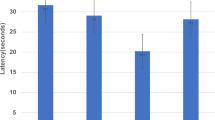Heading
Abstract
Rationale. Muscarinic-acetylcholine receptor agonists are yet to be used clinically for the treatment of Alzheimer's disease (AD) even though laboratory evidence continues to support the potential for such an approach.
Objectives. The purpose of this study was to evaluate the M1-preferring agonist talsaclidine in aged monkeys for effects on working memory.
Methods. Three doses (0.6, 1.2, and 2.4 mg/kg, PO) of talsaclidine and two time intervals (45 min and 8 h) after drug administration were evaluated in seven aged rhesus macaques trained to perform a computer-assisted delayed matching-to-sample (DMTS) task. The relative effectiveness of talsaclidine was also compared with another M1-preferring agonist WAY-132983 that was previously studied in this laboratory.
Results. Talsaclidine improved DMTS accuracy only during sessions initiated 8 h after administration of one of the doses (i.e. 0.6 mg/kg). The drug's enhanced effectiveness at the 8-h time point relative to the 45-min time point was surprising in view of the fact that plasma concentrations were highest 45 min after administration. A higher dose of talsaclidine (4.7 mg/kg) resulted in side effects (lethargy and excessive drooling) in some animals. Individualized optimal doses of talsaclidine were associated with 7.4% and 10.6% improvement in overall (all trials averaged) DMTS accuracy during the 45 min and 8 h post-administration sessions, respectively. Under similar experimental conditions WAY-132983 increased DMTS accuracy by up to 15.6% above control levels.
Conclusion. Both talsaclidine and WAY-132983 provide at least modest improvements in DMTS accuracy in aged monkeys at some doses; however, challenges remain regarding the achievement of an adequate level of efficacy and reliability while minimizing side effects with these compounds. The positive findings do, however, support further study of the potential use of direct muscarinic agonists in the treatment age-related disorders of memory function.
Similar content being viewed by others
Author information
Authors and Affiliations
Additional information
Electronic Publication
Rights and permissions
About this article
Cite this article
Terry, A.V., Buccafusco, J.J., Borsini, F. et al. Memory-related task performance by aged rhesus monkeys administered the muscarinic M1-preferring agonist, talsaclidine. Psychopharmacology 162, 292–300 (2002). https://doi.org/10.1007/s00213-002-1105-3
Received:
Accepted:
Issue Date:
DOI: https://doi.org/10.1007/s00213-002-1105-3




